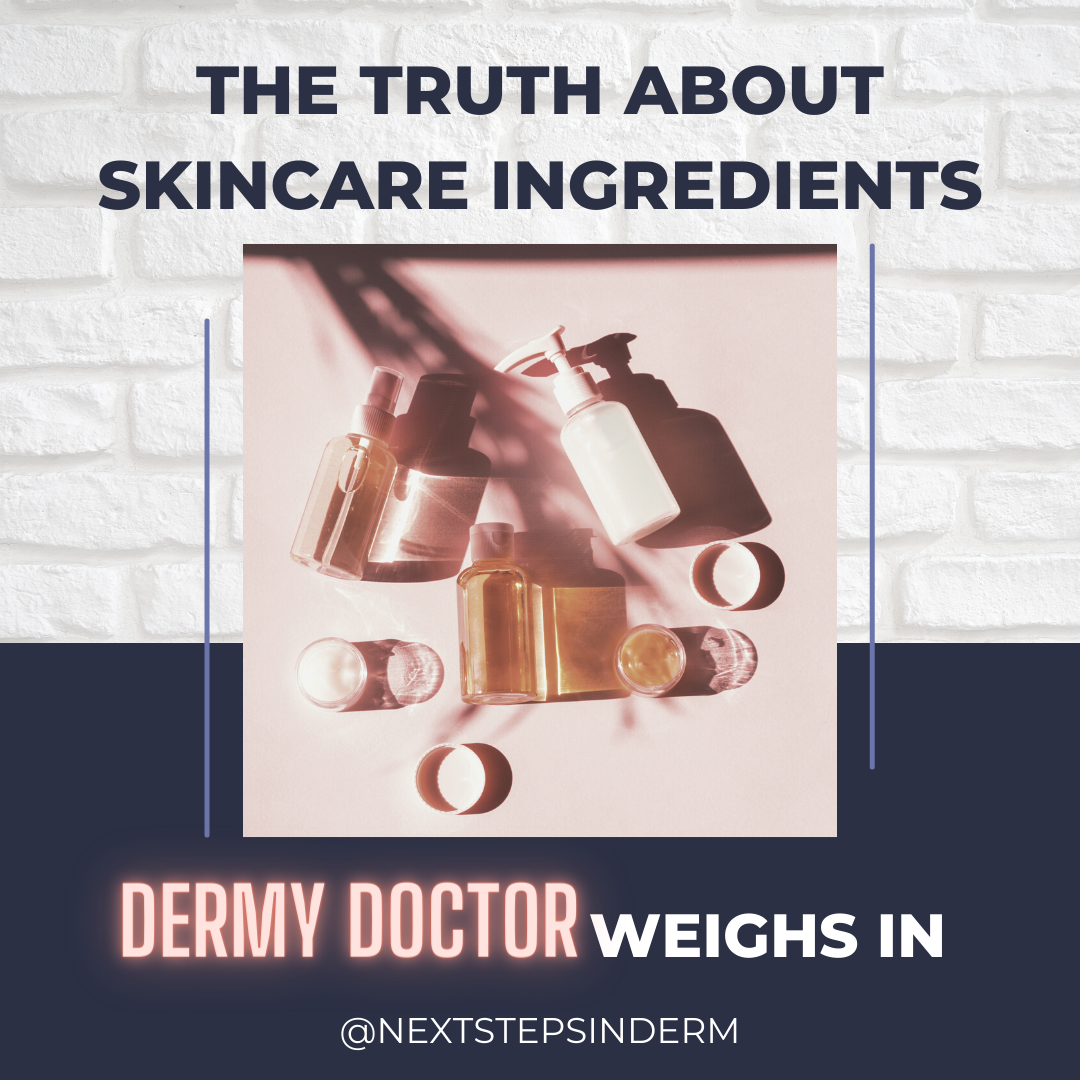Two consumer articles recently posted raise questions about the use of skincare ingredients: SheFinds recently revealed skincare ingredients that are completely useless, and TODAY asked how to use active ingredients. What’s the truth about which skincare ingredients to choose and how to use them?
For answers I reached out to Fatima Fahs, MD, a Michigan-based dermatologist who runs @dermy_doctor, an Instagram account dedicated to disseminating accurate skin care education and dispelling beauty myths.
Are there skincare ingredients on the market today that you believe are completely useless?
Plenty. There are thousands of new products entering the cosmeceutical market every year, and each one claims to be the “next best thing” for your skin. The reality is there’s also a lot of really good marketing to go along with them. One product type that I find to be useless in terms of its claims are “stem cell creams.” While plant stem cells can certainly work to reduce oxidative stress on the skin, they are unable to stimulate or regenerate our own human cells. In addition, a cream that contains preservatives meant to keep it stable on the shelf is unable to host delicate stem cells very long, if at all. Conveniently, these products always seem to come with a hefty price tag to support their use. Another reason why expensive skincare doesn’t necessarily correlate to high quality. That being said, the emerging technology for culturing these plant-based stem cells is promising for purifying the extraction process of plant-based ingredients.
How can dermatologists separate fact from fiction regarding skincare ingredients on the market?Â
It can be difficult to discern the quality of skincare ingredients on the market. This is where I truly believe it is important for us to keep a pulse on the market and be willing to try and test products ourselves. An ingredient list can be enticing, but at the end of the day, formulation matters and two products with the same active ingredient can be completely different in terms of efficacy, based on their formulation. In addition, I would encourage dermatologists to avoid solely relying on industry produced publications, as there is always the possibility of slight bias in these reports. At the same time, these papers can be helpful for understanding mechanisms of action and adverse effects. Books such as the “Cosmeceutical Compendium” by Kavita Mariwalla, MD, can be helpful for deciphering ingredients in an index format.
What active ingredients are proven to be best for different skin conditions and skin types?
With so much information overload in the skincare market, there are definitely some tried and true actives that I counsel patients on depending on their needs:
-
- Salicylic acid, a beta hydroxy acid, is a popular active ingredient in over-the-counter, acne-based cleansers and toners because of its excellent keratolytic effects on the sebaceous gland.
- Azelaic acid is one of my favorite active ingredients for patients struggling with hyperpigmentation, as it is a tyrosinase inhibitor and touts anti-bacterial and anti-inflammatory properties. It is becoming increasingly popular over the counter in serums, although these formulations contain a lower percentage (5-10%) compared to prescription strength (15-20%).
- While vitamin C is a trendy active ingredient in antioxidant serums, it’s formulations and derivatives vary in efficacy. L-ascorbic acid reigns king in terms of available published data, but increasingly popular ester derivatives are proving to be effective and gentler on the skin in addition to offering better shelf life stability.
- Topical tretinoin derivatives are plenty in over-the-counter, night-time serums, moisturizers, eye creams and more. Again, another area where formulation seems to dictate efficacy as we see the rise in encapsulated delivery methods, meant to drive the retinol deeper into the dermis to avoid irritation and boost results.
What advice should dermatologists give their patients regarding choosing skincare products?
Many of my patients come in with an entire shopping bag full of products that they’ve seen online or were told to use based on a viral social media video. I always start by asking my patient what their primary goal is. What skin concern are they looking to treat? Together, we then go through these products and sort by active ingredient, determining if it is one that is useful for achieving this goal, or may hinder our ability to. From there, we simplify the morning and nighttime routine, and I add prescription topicals and orals if necessary.
What are your top tips that you tell your patients when using products with active ingredients?
My biggest tip for patients is to only try one new product at a time. Oftentimes, patients seek a complete skincare routine overhaul and want to change everything at once. Instead, I encourage them to incorporate products into their routine by only adding something new every 5-7 days. If a product has strong actives that risk irritation in a patient with sensitive skin, I have them test the area behind the ear prior to applying to the whole face.
What additional advice do you have for dermatologists in counseling their patients about choosing skincare products and using active ingredients?
In today’s social media crazed world, you have to be open to your patient using more than just your drugstore skincare recommendation that you provided a sample of in the office. Empower your patient to understand their skincare’s active ingredients but explain their mechanisms of action. We as the skin experts need to remain the authority on this topic.
Did you enjoy this Patient Buzz Expert Commentary? You can find more here.

